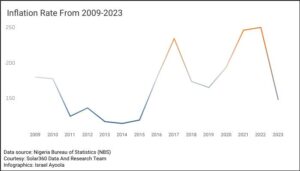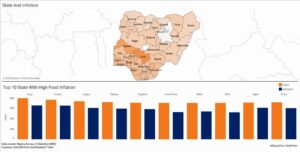
The uptick in the inflation rate was largely driven by the food index, as food inflation accelerated to 25.25% in the review month compared to 24.82% recorded in May 2023. The NBS premised the hike on increase in prices of oil and fat, bread and cereals, fish, potatoes, yam and other tubers, fruits, meat, vegetable, milk, cheese and eggs.
The increase in the core index is on the back of the federal government’s petrol subsidy removal announcement, which saw the price of petrol increase from an average of N185/litre to N500 per litre.

Nigeria can leverage clean energy technologies to produce and preserve agricultural produce, reducing food prices causing hunger and malnutrition.
According to the World Bank, the food security challenge will become more difficult, as the world will need to produce about 70 percent more food by 2050 to feed an estimated 9 billion people.
The persisting war in Ukraine on the back of the embargo on Russian oil and gas by the West is a key reason for the surging food and energy prices across the globe.
The green revolution is critical for food security and increasing the tide of food inflation locally, and poor storage facilities and lack of storage infrastructure result in significant food losses post-harvest.
In the wake of President Bola Ahmed Tinubu’s declaration of an emergency on food security, the Rural Electrification Agency (REA) installed a 100-kilowatt Solar Mini-grid in agrarian communities nationwide through a private developer to mitigate the spiraling cost of energy due to the removal of fuel subsidies.
Energizing agriculture through clean energy solutions can provide a practical solution to this just like the REA through the support of some private energy firms.
Arable lands in Nigeria are in rural locations with no grid supply; thus, exploring the deployment of decentralized energy sources to power farmlands and storage facilities will indeed revolutionize agriculture in the country and make Nigeria a net exporter of food.
Also, produce from the farm can be stored in solar-powered storage facilities and cold rooms thus eliminating the cyclic availability of farm produce, reducing wastage and improving availability in the market all season, eliminating inflation.
The increased adoption of climate-smart agriculture (CSA) intervention can reduce the hike in food prices in Nigeria, producing more and better food to improve nutrition security and boost incomes.
According to a statement by the World Bank, CSA is an integrated approach to managing landscapes – cropland, livestock, forests and fisheries that address the interlinked challenges of food security and climate change.
The statement also revealed that agriculture is a major part of the climate problem, currently generating 19 to 29 percent of total greenhouse gas (GHG) emissions. It added that, without action, the percentage could rise substantially as other sectors reduce their emissions.
Additionally, 1/3 of food produced globally is either lost or wasted. Addressing food loss and waste is critical to helping meet climate goals and reduce stress on the environment.
The green revolution comes with energy efficiency technologies that enable familiar agricultural equipment to be redesigned and made energy-efficient while being powered by cleaner energy sources.
Deploying these tools to the farm using less energy can yield more value. This will, in essence, improve the margin retained by farmers and incentivize more food production, given reduced energy costs.
Where local manufacturing industries and haulage industry transit from reliance on diesel to cleaner energy sources like gas and solar, electric and gas-fired trucks, it will enable energy cost saving in the long run and ensure stable and security of energy supply thus smoothing out the food inflation curve.
In addition, if industries are using less diesel, it reduces their cost of production because they are now relying on clean energy.
Also, once the operational cost is reduced, other costs in the market for food preservation and transportation will be reduced as well. In this manner, inflation, especially on food, can be managed.


